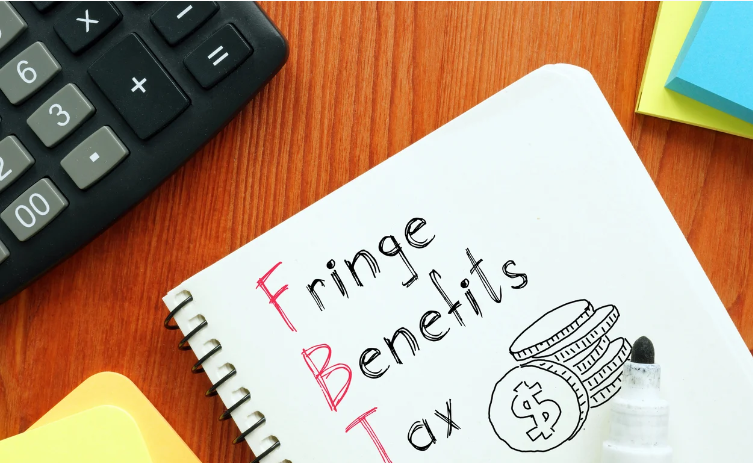What you need to know about recent areas of concern from the Australian Taxation Office (ATO), and common FBT concessions
What is Fringe Benefit Tax?
Fringe Benefits Tax is typically levied on certain cash and non-cash benefits received by employees from their employer. In some cases, this can also include benefits provided to associates or family members of an employee.
Common Fringe Benefits include (but are not limited to) meals, gifts, gym memberships, entertainment and company cars provided to employees.
The Fringe Benefits Tax year runs between 1st April and 31st March each year. Upon completion of the year, employers are required to self-assess and lodge a Fringe Benefits Tax return that calculates the taxable value of benefits provided to employees.

Recent areas of ATO concern:
Recent legislative developments and court cases will affect employers preparing their 2024 FBT Return.
Travelling (overnight) on work
The ATO in recent years have introduced a ‘rule of thumb’ to identify when an employee is ‘travelling on work’ as opposed to living away from home, or relocating.
To qualify under this blanket treatment, the following circumstances must be satisfied:
- The employee is away from their normal residence for work purposes for a short period, that is:
- No more than 21 calendar days at a time continuously; and
- No more than 90 calendar days in total at the same work location in the same April to March period.
- The employee returns to their normal residence when their period away ends, and;
- The employee does not work on a fly-in-fly-out or drive-in-drive-out basis.
Of course, employees can still be found to be travelling when deployed for a longer period. However, employers then need to rely on a test of probabilities based on multiple factors to discern whether the employee is travelling or has been relocated.
Determining if an employee is travelling on work versus travelling to a workplace is vital in order to avoid unexpected (and unwanted!) fringe benefits tax liabilities on the value of any allowances paid to employees, and travel costs incurred on their behalf.
Motor vehicle logbooks
The ATO has highlighted that employees must stick to stringent documentation and record-keeping when preparing a logbook under the operating cost method. A logbook will be valid for 4 FBT years (i.e. valid across 5 calendar years).
The following details must be of record for every single journey:
- 1Start and end dates;
- 1Start and end odometer readings;
- 1Total kilometers travelled, and;
- 1Purpose of the trip taken.
Car parking fringe benefits – commercial parking stations
The ATO’s definition of a ‘commercial parking station’ now includes car parking stations that charge penalty rates to discourage all-day parking. The broadened scope will include car parks associated with airports, shopping centres or hospitals. This change in definition has been in effect since the 1st of April 2022.
Employees and contractors – correction to legal interpretation
Following on from a couple of landmark court case decisions in regard to the common law definition of an employee, there is now a departure from looking at the factual relationship. Rather, the legal rights and obligations of a contract (without regard to how the contract was actually performed) will determine the employment status of a person within any such working arrangement. This distinction has the crucial impact of potentially resulting in employers becoming liable for fringe benefits tax on any non-monetary benefits provided to individuals employed via contractor arrangements.
Are there exemptions available for certain Fringe Benefits?
Thankfully, concessions do exist which allow employers to remunerate their employees via non-monetary benefits that are not become subject to Fringe Benefits Tax.
The Otherwise Deductible Rule
Where an employee incurs a personal expense which is then reimbursed by their employer, and the expense could have been treated as a tax deduction by the employee, the ‘otherwise deductible’ rule applies. This results in the value of the Fringe Benefit provided being reduced to nil for the employer.
For example, an employer paying for an employee’s education course could be an exempt fringe benefit under the ‘otherwise deductible’ rule, in the instance that the course would be a deductible self-education expense if paid for by the employee.
Minor Benefits
There are also specific carve-outs within FBT legislation which exempt individual benefits provided to employees, such as:
- 1Portable electronic devices where a computer software, laptop, phone, etc is primarily provided for use in an employee’s employment;
- 1Memberships fees and subscriptions for corporate credit cards, airline lounge memberships, or subscriptions to trade or professional journals;
- 1Single-trip taxis which begin or end at the employee’s place of work;
- 1Membership to professional associations;
- 1Refreshments (morning tea and afternoon tea items, light meals without alcohol) provided to employees at work premises, and;
- 1Meals provided to employees on a working day and in person at work premises.
In such cases, the employer is also entitled to claim a GST credit and income tax deduction for the minor benefit provided to an employee.
For more information or to discuss any of the above concerns or exemptions, please do not hesitate to contact your Accru advisor.
 "
"